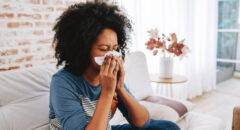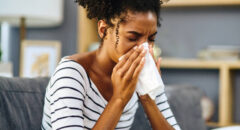 Whether you’re traveling for business or pleasure, it’s hard to enjoy yourself if you’re worried about how your allergies may act up. Outside of your usual routine, it can be challenging to manage food and pollen allergies in new environments, but it’s not impossible. Careful preparation before traveling will not only make things smoother for you, but also help you avoid a life-threatening allergic reaction or inconvenient sinus discomfort that could cost you a trip to the doctor instead.
Whether you’re traveling for business or pleasure, it’s hard to enjoy yourself if you’re worried about how your allergies may act up. Outside of your usual routine, it can be challenging to manage food and pollen allergies in new environments, but it’s not impossible. Careful preparation before traveling will not only make things smoother for you, but also help you avoid a life-threatening allergic reaction or inconvenient sinus discomfort that could cost you a trip to the doctor instead.
Use these tips to help allergy-proof your next trip.
Food Allergies
Researchers estimate that up to 15 million Americans have food allergies, with the number steadily increasing, especially among children. According to Dr. William Calhoun of the University of Texas Medical Branch, it’s extremely important for people with food allergies to be even more cautious while traveling and “watch their dietary intake.”
- Read labels and ingredients when shopping and eating away from home.
- Bring your own snacks, especially if you’re on a flight serving peanuts and you have a peanut allergy.
- Carry an ID card that lists all foods you’re allergic to, as well as your emergency contact information. You can present this card at a restaurant, or have it on you in case of a medical emergency.
- Pack extra medications, including your epinephrine autoinjector. An epinephrine autoinjector, sometimes called by the shortened brand name Epipen, is the only treatment for anaphylaxis, a life-threatening reaction that can include difficulty breathing and closure of the throat.
- Translate your allergies if traveling abroad in the language of your destination. Resources are available online to assist you.
READ: Foods That Trigger Asthma Symptoms
Environment Allergies
From outdoor pollen to indoor dust and pet dander, several things in your environment can trigger an allergic reaction. Dr. Clifford Bassett, director of Allergy & Asthma Care of New York, recommends being extra prepared no matter what environment you think you’re traveling to.
- Bring dust mite-proof allergy covers for pillows and mattresses to protect against dust mites in unfamiliar sleeping quarters.
- Pack a big hat and sunglasses to keep pollens out of your hair and eyes. The bigger the better!
- Request a pet-free hotel room or floor.
- Research the pollen levels in your destination and plan outdoor activities accordingly. You can check pollen levels via the National Allergy Bureau website.
- Bring saline nasal spray to keep your nasal passages moist, especially on long, stuffy flights.
If you have serious allergies, or are planning an extended trip, the best prep may be to consult your doctor first!
Visit the BlackDoctor.org Allergy center for more articles.








